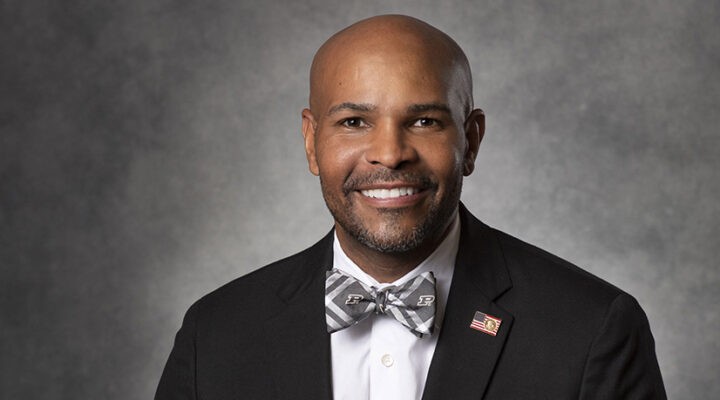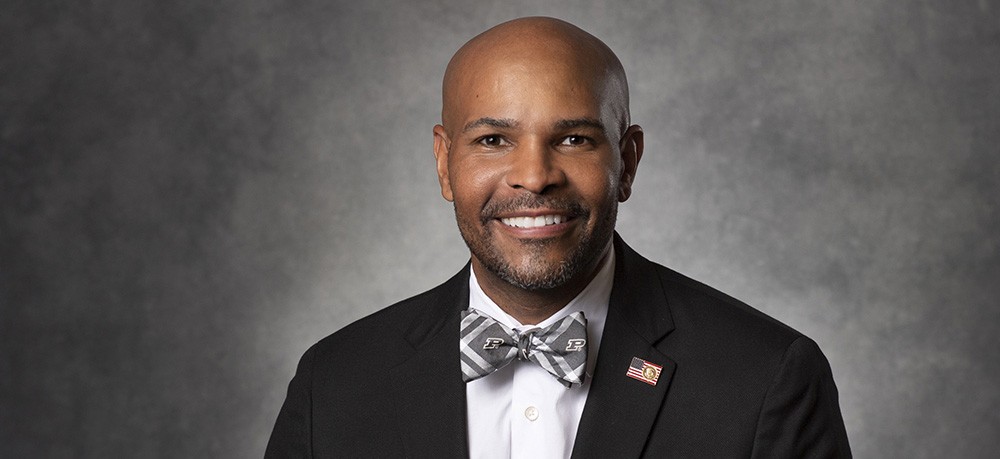Former U.S. Surgeon General Jerome Adams found himself at the center of American history in dealing with a once-in-a-century pandemic. Now he wants Americans to understand that while things are improving, the pandemic is still with us.
“I do think things are improving. But I don’t want people to believe this pandemic is going to magically end in April or May or June,” said Adams, who now leads the Health Equity Initiative at Purdue University in Indiana.
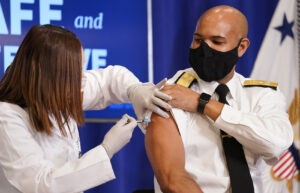
U.S. Surgeon General Jerome Adams receives a Pfizer-BioNTech COVID-19 vaccine shot at the Eisenhower Executive Office Building on the White House complex, Friday, Dec. 18, 2020, in Washington. (AP Photo/Andrew Harnik)
“From a political and behavioral point of view, people are tired of it,” he explained. “The federal government and state governments and governors are responding in kind by removing these precautions. What people need to know is that we’ve never had more tools to take care of ourselves.”
To make his point, Adams offers a simple acronym: MTV.
M stands for masking. “Whether there’s a mask mandate or not, wearing a mask is an effective tool to help provide an extra layer of protection for you if you’re unvaccinated or if you’re vulnerable, or if you’re living with someone vulnerable.”
T stands for testing and treatment. “If you’re having symptoms, you need to go in and get tested because we have oral medications. We have monoclonal antibodies to lower your chances of being hospitalized or dying.”
V stands for vaccines. “If you do get sick then we have vaccines, getting vaccinated and boosted. That significantly lowers your chance of getting the infection in the first place or getting hospitalized.”
Following the MTV protocol is “how we shift to what this new normal will look like,” he said.
Working as surgeon general in the Trump administration during a global pandemic put Adams in the spotlight but also in the crosshairs of criticism from both left and right — as well as from the president himself.
“I think it’s fair to say that he’s a difficult person to work for,” Adams said of Trump. “I think anyone would agree with that. He had a TV show where he was famously difficult to work for, where at the end of the day he fired everybody.”
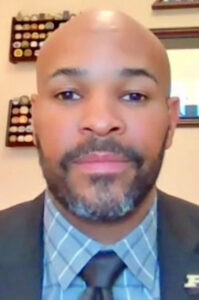
Jerome Adams
Although he didn’t get fired by Trump, he left the White House and has now settled into his new office at Purdue. Now more relaxed and sporting a beard, he still insists there is a way to navigate the pandemic with care.
He remains a person of deep faith, which may explain his sincerity and confidence in knowing he did the best he could while at the center of the pandemic response.
“I’ll tell you when my life changed and when the United States life changed. My life changed because, believe it or not, I was about to get on a plane and go to American Samoa because they were having a really big measles outbreak there,” he explained.
“If you remember, prior to 2020 and 2019, we almost lost our measles eradication status in the United States. We had outbreaks in the state of Washington and Oregon and New York City. And we were having these huge outbreaks, and we’d had a big outbreak in American Samoa and I was supposed to go there and the trip got pulled down at the last minute because, hey, this COVID thing is really starting to heat up.
“Ironically, vaccine hesitancy was what I was dealing with at the beginning of 2020.”
“So, ironically, vaccine hesitancy was what I was dealing with at the beginning of 2020. My trip to address vaccine hesitancy was pulled down because of the pandemic. But the funny thing — and I say this with a little bit of humor but also to show you where our priorities are in this country — when America first realized this was serious was actually when the Utah jazz game got canceled. And then immediately after that, March Madness got pulled down and that’s when America said, ‘Whoa, you’re messing with our sports here.’
“When you start messing with our sports, that’s when it gets really serious. And I think we need to reflect on that. We need to really think about where our priorities are when health and safety aren’t our No. 1 priorities, but when other things in life, like a sporting event, become the barometer for whether or not we need to take a health situation seriously.”
Looking back, Adams realizes he has lived every day from that time with the pandemic on his mind. And he says it was his faith that guided him during the trying times.
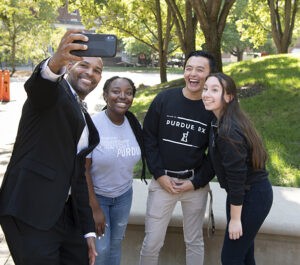
Jerome Adams poses with students on the Purdue campus. (Purdue University photo/John Underwood)
“I believe God doesn’t put you in positions where you’re going be comfortable,” he said. “God puts you in positions where you can be of service. And so that’s the approach I’ve always taken to public service. I’m never really shocked when God throws something my way that presents a new challenge.”
While enjoying his new challenges as a professor and administrator at Purdue, Adams said he misses his former colleagues, whose names as well-known to all Americans: Francis Collins and Anthony Fauci.
“Dr. Fauci and I would get together at nights and we would go over our talking points for hours,” Adams said. “And then you’d go up and do a morning interview, you’d say, ‘I got none of my talking points.’ It was incredibly frustrating. And they framed it in a way that caused their viewers to be mad at me. All three of us would get death threats. I still get death threats when I do national outlets. What I learned was, OK, that’s not the best venue to have these conversations. Which is why I decided to go out where the people are.”
At Purdue, he’s happy to get back to what he loves most — science and medicine. “I’m not a politician, I’m a doctor and scientist.”
Yet there’s one other role he enjoys more than being a doctor and scientist: Being a husband and father of three kids.
“You know, I’m a parent struggling, like most citizens of the United States, with this pandemic. Trying to figure out what comes next and how we stay safe and how to make smart choices. But personally, I’m in a good spot, and praise God for that.”
Related articles:
What my interview with Anthony Fauci taught me about cave living | Opinion by Maina Mwaura
Anthony Fauci: Faith leaders needed in the fight against COVID
Francis Collins: ‘Give God the glory’ for vaccines ‘but roll up your sleeve’

